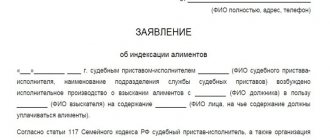The purpose of the preliminary court hearing:
- determining the readiness of the case for trial in court.
At a preliminary court hearing, the case is considered by a single judge with notification of the parties and other interested parties about the time and place of its holding. These persons have the right to participate in the preliminary court hearing by using video conferencing systems in accordance with Article 153.1 of the Arbitration Procedure Code of the Russian Federation.
If the duly notified plaintiff and (or) defendant and other interested parties who may be involved in the case fail to appear at the preliminary court hearing, the hearing is held in their absence.
Important point
The parties must be notified by the court of the preliminary hearing. The notice must be adequate. This means that the participants in the hearing must actually know about the date, place and time of the hearing. The case materials must contain information that the parties received the relevant notice. If this information is missing and the participants do not appear at the appointed time, the hearing will be postponed.
If the parties were duly notified, but did not appear at the meeting, it is held in their absence.
1. At a preliminary court hearing, the case is considered by a single judge with notification of the parties and other interested parties about the time and place of its holding. These persons have the right to participate in the preliminary court hearing by using video conferencing systems in accordance with Article 153.1 of this Code. (as amended by Federal Law No. 228-FZ of July 27, 2010) (see the text in the previous edition) If the duly notified plaintiff and (or) defendant, other interested parties who may be involved in In fact, the meeting is held in their absence. 2. The arbitration court at the preliminary court hearing: 1) resolves the petitions of the parties; 2) determines the sufficiency of the evidence presented, brings to the attention of the parties what evidence is available in the case; 3) submits for consideration issues resolved during the preparation of the case for trial, and performs other procedural actions provided for by this Code. 3. At the preliminary court hearing, the parties have the right to present evidence, make motions, and present their arguments on all issues arising at the hearing. 4. The court, at the request of the persons participating in the case, has the right to announce a break in the preliminary court hearing for a period of no more than five days for them to present additional evidence. 5. After completion of the consideration of all issues raised at the preliminary court hearing, the arbitration court, taking into account the opinions of the parties and third parties involved in the case, decides on the readiness of the case for trial.
Commentary on Article 136 1. The preliminary court hearing is a new procedural institution for the arbitration process. The purpose of holding a preliminary hearing is to check the readiness of the case for trial. In most cases, a preliminary court hearing is mandatory, with the exception of simplified proceedings and bankruptcy cases. In cases of administrative legal relations, based on the characteristics of a particular case, a preliminary court hearing may be absent. This approach can be explained primarily by the shortened deadlines that are established for the preparation and consideration of certain categories of cases on administrative legal relations. The law does not prohibit making an independent determination on the time and place of a preliminary court hearing. However, in practice, most often about time and
256 The location of the preliminary court hearing is stated in the ruling on preparing the case for trial or in the ruling on accepting the case for proceedings. Typically, judges make one ruling on accepting the claim for proceedings, preparing the case and scheduling a preliminary court hearing. The preliminary court hearing is held by a single judge with notification of the parties and other interested parties about the time and place of its holding. At the beginning of the preliminary court hearing, the court checks the availability of notices of notification of persons participating in the case. If the duly notified plaintiff and (or) defendant and other interested parties who may be involved in the case fail to appear at the preliminary court hearing, the hearing is held in their absence (Part 1 of Article 136 of the Arbitration Procedure Code of the Russian Federation). In accordance with Part 1 of Art. 136 of the Arbitration Procedure Code of the Russian Federation in a preliminary court hearing, the case must be considered by a single judge. However, in reality the case is not considered, since there cannot be an examination of the evidence, since this is the prerogative of the trial, therefore witnesses, experts, etc. are not called. The purpose of the preliminary court hearing is different - to check whether the case is ready for consideration. 2. Part 2 art. 136 of the Arbitration Procedure Code of the Russian Federation defines the main actions that make up the content of the preliminary court hearing: 1) resolution of the parties’ petition. These may be petitions to include written and material evidence in the case, to call witnesses, to order an examination, to allow a representative to participate, to involve third parties who do not make independent claims on the subject of the dispute, etc. Judges often postpone the decision on the involvement of third parties who do not make independent claims on the subject of the dispute until the preliminary court hearing, although by virtue of the law this can be done earlier. In this case, a determination must be made to involve third parties who do not make independent claims on the subject of the dispute; 2) determining the sufficiency of the evidence presented; the parties are informed of what evidence is available in the case. The court evaluates the sufficiency of evidence only preliminary, since at this stage it is too early to talk about the final assessment of the evidence. Nevertheless, the court and the persons participating in the case check what evidence is insufficient; 3) submitting for consideration issues resolved during the preparation of the case for trial, and performing other procedural actions provided for by the Arbitration Procedure Code of the Russian Federation. Until now, one of the problems in the application of arbitration procedural legislation remains the possibility of termination and suspension of proceedings in the case, leaving the application without consideration at the preliminary court hearing. The APC of 2002 and the Code of Civil Procedure of the Russian Federation approached this issue differently. Article 152 of the Code of Civil Procedure of the Russian Federation directly provides for the possibility of suspending and terminating the proceedings, leaving the application without consideration at the preliminary court hearing. The Arbitration Procedure Code of the Russian Federation does not directly provide for such a right of the court. Some doubts about the legality of termination of proceedings in the case, leaving the application without consideration and suspension of proceedings in the case at the stage of preparing the case are due to a number of factors. Firstly, in the Code, the procedural institutions of suspending proceedings in a case, terminating proceedings in a case, leaving an application without consideration are textually located after the provision on preparing the case for a court hearing and before the trial. Secondly, the suspension of the proceedings in the case is considered a temporary stop of the process, and the termination of the proceedings in the case and leaving the application without consideration is the end of the proceedings in the case without a court decision. However, the parties, by virtue of Art. 136 of the Arbitration Procedure Code of the Russian Federation can file any petition, including to terminate the proceedings, leave the application without consideration, or to suspend the proceedings. There is hardly any need to go to court just to terminate the proceedings, suspend the proceedings or leave the application without consideration, especially since there are mandatory grounds for suspending the proceedings, and actually going to the court is not of fundamental importance for the decision this issue. The possibility of performing these actions at a preliminary meeting was discussed earlier, although practice follows different paths. ——————————— Sherstyuk V.M. On the application of the norms of the Arbitration Procedural Code of the Russian Federation of 2002 // Arbitration practice. 2003. N 9. P. 71 - 72. The answer to the question about the possibility of concluding a settlement agreement in a preliminary court hearing is given in the information letter of the Presidium of the Supreme Arbitration Court of the Russian Federation dated August 13, 2004 N 82:
257 “According to Part 2 of Article 141 of the Arbitration Procedure Code of the Russian Federation, the issue of approving a settlement agreement is considered at a court hearing. If the parties agreed to conclude a settlement agreement during the preparation of the case for trial, which the arbitration court became aware of at the preliminary court hearing, the court may, in the manner established by Part 4 of Article 137 of the Code, complete the preliminary court hearing, open the court hearing in the first instance and consider in it the issue of the possibility of approving a settlement agreement” (paragraph 27). 3. At the preliminary court hearing, the parties have the right to present evidence, make motions, and present their arguments on all issues arising at the hearing. But evidence is not subject to examination at the preliminary court hearing. Thus, during a preliminary court hearing in the case of challenging the contract, the judge came to the conclusion that the contract was invalid, and therefore, the contractual jurisdiction was invalid. In this regard, the court issued a ruling to transfer the case to another court with jurisdiction. Such a conclusion of the court is unacceptable at the stage of preparing the case. During the preliminary court hearing, the court does not examine the evidence and therefore cannot reach a resolution of the case on its merits. 4. According to Part 4 of Art. 136 of the Arbitration Procedure Code of the Russian Federation, at the request of persons participating in the case, the court has the right to announce a break in the preliminary court hearing for a period of no more than five days for them to present additional evidence. In practice, this rule is not always implemented, because usually five days are not enough to present evidence. At a meeting of the Scientific Advisory Council at the Federal Arbitration Court of the Central District, the issue of the possibility of postponing the preliminary court hearing was discussed. In the Recommendations for the application of the Arbitration Procedure Code of the Russian Federation, the Scientific Advisory Council gave the following explanation: “Delaying consideration of the case at a preliminary hearing does not contradict the norms of the Arbitration Procedure Code of the Russian Federation.” ——————————— Recommendations for the application of the new Arbitration Procedural Code of the Russian Federation // Arbitration practice. 2003. N 4. P. 42. The absence in the law of a direct indication of the possibility of postponing the preliminary court hearing and the location of Art. 158 Arbitration Procedure Code of the Russian Federation in Ch. 19 “Court proceedings” have led to the fact that judicial practice develops differently: a number of judges, if necessary, schedule a second preliminary court hearing or re-announce a break, which is not prohibited by law, others arrange a postponement of the preliminary court hearing. However, the postponement of the preliminary court hearing is not provided for by current legislation. The law only names a break, adjournment and suspension of the proceedings as a temporary stop to the process. The 2002 APC does not provide for other forms, including transfer. At the same time, practice has taken the path of assigning several breaks, each of which is no more than five days, or applying a postponement of the preliminary court hearing. 5. After completing the consideration of all issues raised at the preliminary court hearing, the arbitration court, taking into account the opinions of the parties and third parties involved in the case, decides on the readiness of the case for trial (Part 5 of Article 136 of the Arbitration Procedure Code of the Russian Federation). In accordance with Art. 155 of the Arbitration Procedure Code of the Russian Federation, a protocol is kept during each court hearing, as well as when performing certain procedural actions. The Code does not provide for keeping minutes during a preliminary court hearing and when considering a case in cassation proceedings. Nevertheless, all statements and petitions of persons participating in the case and the results of their consideration must be contained in the case materials and reflected in the ruling or resolution of the arbitration court or in the protocol on the commission of a separate procedural action. ——————————— Clause 16 of the Resolution of the Plenum of the Supreme Arbitration Court of the Russian Federation dated December 9, 2002 N 11 “On some issues related to the implementation of the Arbitration Procedural Code of the Russian Federation.” Most arbitration courts keep records of preliminary court hearings, based on the norm of Art. 155 of the Arbitration Procedure Code of the Russian Federation on maintaining a protocol when performing certain procedural actions. When moving from the preliminary court hearing to the consideration of the case in the court hearing of the first instance (clause 4 of Article 137 of the Arbitration Procedure Code of the Russian Federation), many judges continue to maintain the same protocol, although it is possible to maintain a new protocol - the protocol of the court session. Persons participating in a case and their representatives often request that the case be considered in their absence. Does such a motion mean that there are no objections to the transition from the preliminary hearing to the main hearing? In such cases it is worth being
258 careful. Typically, a person participating in the case asks for the case to be considered in his absence and does not express his consent to move to the main hearing from the preliminary hearing or even to hold a preliminary court hearing in his absence.
Tasks and purposes of preparing a case for trial. Preparation time
Preparing any case for trial is a mandatory and independent stage of the arbitration process. It is during this process that the judge establishes the nature of the existing relationship between the plaintiff and the defendant, determines the list of legal acts governing these legal relations, and invites the parties to submit the missing documents for a more efficient and quick consideration of the case.
In Art. 133 of the Arbitration Procedure Code of the Russian Federation defines the main tasks of preparing a case for trial:
- determining the nature of the disputed legal relationship and the legislation to be applied;
- determination of circumstances relevant for the correct consideration of the case;
- resolving the issue of the composition of persons participating in the case and other participants in the arbitration process;
- providing assistance to persons participating in the case in presenting the necessary evidence;
- reconciliation of the parties.
Preparing a case for trial is carried out by a single judge for each case pending before the arbitration court of first instance in order to ensure its correct and timely consideration (Article 133 of the Arbitration Procedure Code of the Russian Federation). From the provisions of this article we can conclude that the stage of preparing a case for trial is applicable only in the court of first instance.
The period for preparing a case for trial is determined by Art. 134 of the Arbitration Procedure Code of the Russian Federation and constitutes the necessary period of time, determined by the judge, taking into account the circumstances of the particular case and the need to perform the relevant procedural actions, and ends with a preliminary court hearing, unless otherwise established in accordance with the Arbitration Procedure Code of the Russian Federation.
On the preparation of the case for trial, the judge issues a ruling in which the parties are advised of the possibility of filing a petition for consideration of the case with the participation of arbitration assessors, as well as for the commission of other actions by persons participating in the case, and the deadline for their implementation (Article 134 of the Arbitration Procedure Code of the Russian Federation) .
It should be noted that in Part 1 of Art. 134 of the Arbitration Procedure Code of the Russian Federation does not clearly define the moment of accepting a statement of claim and issuing a ruling on preparing the case for trial. In practice, as a rule, both actions are performed simultaneously by issuing one determination.
When preparing a case for trial, the judge performs the following actions:
- calls the parties and (or) their representatives and conducts interviews with them in order to clarify the circumstances relating to the substance of the stated claims and objections; proposes to disclose the evidence supporting them and, if necessary, provide additional evidence within a certain period; explains to the parties their rights and obligations, the consequences of performing or not completing procedural actions within the prescribed period; determines, in agreement with the parties, the deadlines for submitting the necessary evidence and holding a preliminary court hearing;
- explains to the parties their right to consider the case with the participation of arbitration assessors, the right to refer the dispute to an arbitration court, the right to apply at any stage of the arbitration process in order to resolve the dispute for assistance from a mediator, including a mediator, in the manner established by federal law, and the consequences of such actions, takes measures for the parties to conclude a settlement agreement, promotes reconciliation of the parties;
- assists the parties in obtaining the necessary evidence, requests, at the request of the parties, and in cases provided for by the Arbitration Procedure Code of the Russian Federation, on its own initiative, the necessary evidence, resolves issues regarding the appointment of an examination, calling experts, witnesses to the court hearing, engaging an interpreter, specialist, the need for an on-site examination written and material evidence, and also takes other measures for the parties to present evidence;
- at the request of the parties, resolves issues of securing a claim, providing counter-security, as well as securing evidence, sends letters rogatory;
- considers issues of other persons joining the case, replacing an inappropriate defendant, combining and separating several claims, accepting a counterclaim, and the possibility of holding a mobile court hearing;
- performs other actions aimed at ensuring the correct and timely consideration of the case (Article 135 of the Arbitration Procedure Code of the Russian Federation).
An important feature of Russian arbitration legislation is that the stage of preparing a case for trial does not apply to all categories of cases.
Thus, in cases of insolvency, cases considered in a simplified manner, cases of recognition and enforcement of decisions of foreign courts and foreign arbitration awards, a preliminary court hearing is not held.
Commentary to Art. 136 Arbitration Procedure Code of the Russian Federation
1. The main purpose of the preliminary court hearing is to complete the preparation of the case by resolving organizational and procedural issues with the participation of the parties and third parties, the solution of which at the stage of preparation of the case allows for the trial to be carried out quickly and with maximum effect.
The preparation of most cases considered by arbitration courts is completed by holding a preliminary court hearing. With few exceptions, holding a preliminary hearing is a mandatory element of preparing a case for trial (see commentary to Article 134 of the Arbitration Procedure Code).
In accordance with clause 1, part 1, art. 135 of the APC, the duration of the preliminary court hearing is determined by the judge in agreement with the parties during the interview. Of course, this is necessary in cases of consideration of cases requiring the presentation of additional evidence, resolution of requests of the parties, involvement of other persons in the case, or when it is possible for the parties to enter into a settlement agreement. However, in most cases, the judge independently determines the date and place of the preliminary court hearing, indicating this in the ruling on the preparation of the case, combined with the ruling on accepting the application, or by sending separate written notices to the parties.
Notification of the participants in the process of the time and place of the preliminary court hearing is carried out according to the rules established in Chapter. 12 APK. The parties, applicants, the prosecutor, state bodies, local self-government bodies and other bodies in the event of their filing an application with the arbitration court, and previously involved third parties must be notified of the preliminary court hearing. Potential third parties may also be notified of the time and place of the preliminary meeting (the issue of their involvement will be the subject of discussion at the meeting).
The novelty, according to Federal Law No. 194-FZ dated July 27, 2010, is that the parties and other interested parties have the right to participate in the preliminary court hearing through the use of video conferencing systems (see commentary to Article 153.1 of the APC).
If participants in the process, including the plaintiff or applicant, duly notified of the time and place of the meeting, fail to appear, the preliminary hearing may be held in their absence.
A preliminary court hearing is always conducted by a single judge, including in cases requiring mandatory collegial consideration.
2. The procedure for holding a preliminary court hearing is less formalized than a trial and is determined by the judge. At the beginning of the meeting, the presiding officer announces the name of the court and the case number, the names of the parties and other participants in the case who have entered or are involved in it, the subject of the claim, checks the powers of the persons who have appeared, and announces the composition of the court.
Although the issue of the possibility of challenging a judge, his assistant, the court secretary, a previously appointed expert, a translator present at the meeting, the APC has not been clearly resolved, it can be assumed based on the logic of the process and the content of the Code that a challenge at this stage is permissible. Firstly, in accordance with Part 2 of Art. 24 of the APC, a challenge can be filed before the start of the consideration of the case; secondly, the success of the trial and, accordingly, the quality of judicial act, thirdly, the judge, even for external reasons (if, for example, he has already participated in the previous consideration of this case as a judge, prosecutor, assistant judge, court secretary, representative, expert, translator or witness) in principle not may take part in the consideration of the case.
After the organizational issues of holding a preliminary hearing are resolved, the judge hears or reads out the parties’ requests (for the presentation and request of evidence, for accepting security for a claim or its cancellation, replacement, for accepting a counterclaim, for summoning witnesses, translators, experts to the trial, for the appointment of arbitration assessors , on the involvement of third parties, etc.), informs the participants in the case about the available evidence, determines its sufficiency and obliges the parties to provide additional evidence, brings up other issues for consideration (for example, on holding an off-site meeting, on separating or combining claims, on holding separate meetings in the case, on concluding a settlement agreement, etc.).
The protocol of the preliminary court hearing (written and audio recording) is kept at the discretion of the judge. If the judge decides that a protocol is necessary, it is kept and executed by either his assistant or the court secretary in accordance with the rules established by Art. 155 APK.
3. During a preliminary hearing, the parties have the right to present evidence, including filing a statement about falsification of evidence, filing motions, making statements, giving explanations and presenting arguments on all issues arising at the hearing. It should be noted that the preliminary court hearing is designed to resolve procedural issues in preparing the case for trial, therefore, during its conduct, evidence is not assessed, but examined only for its relevance, admissibility, authenticity and completeness. At the preliminary hearing, the court cannot hear witnesses, experts, or conduct judicial debates (clause 23 of the Resolution of the Plenum of the Supreme Arbitration Court of the Russian Federation dated December 20, 2006 N 65 “On preparing the case for trial”).
Also, at the preliminary hearing, the judge and the participants in the process should not evaluate their demands and objections; the parties should only clarify them if necessary and disclose evidence, so that the other party has the opportunity to prepare for the trial. A big role in ensuring that the preliminary hearing goes towards its goal - preparing and creating conditions for holding a court hearing to consider the dispute on the merits, and does not turn, without a formal opening, into the court hearing itself, belongs to the judge, whose main function is to provide targeted leadership actions of meeting participants.
4. A break may be declared at the preliminary hearing for a period of no more than five working days in order to provide persons participating in the case with the opportunity to present additional evidence, conclude a settlement agreement, and resolve a number of other issues: on the participation of arbitration assessors in the case, for example. A break can be declared again, taking into account the need to complete the preparation of the case on time (clause 24 of the Resolution of the Plenum of the Supreme Arbitration Court of the Russian Federation dated December 20, 2006 N 65 “On preparing the case for trial”).
About the break in the preliminary court hearing, the arbitration court enters information into the minutes of the meeting; if persons participating in the case are present at the meeting, they sign in the minutes. Also, information about the break is entered into the electronic file of the case and can be obtained by interested parties upon review on the website of the arbitration court.
5. Having resolved all the issues raised at the preliminary hearing, the judge gives the parties and involved third parties the opportunity to express an opinion on the readiness of the case and the possibility of scheduling a trial. After listening to the opinions of the participants in the meeting and coming to the conclusion that the case is ready, the judge decides whether to assign the case to trial.






